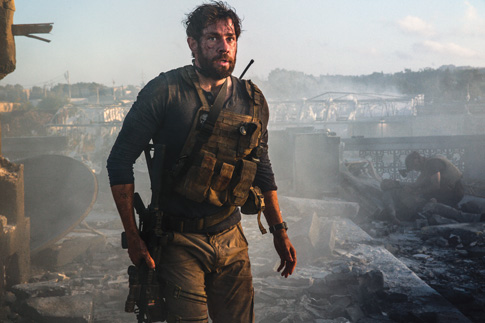By Joseph McAleer

Some might fear, simply from reading its title, that “13 Hours: The Secret Soldiers of Benghazi” (Paramount) would turn out to be little more than a rehash of the congressional hearings on the 2012 terrorist attack in Libya.
In reality, the film is a gripping, fact-based account of what happened on the ground when the U.S. consulate in the titular city was overrun, and four American lives – most prominently that of Ambassador Chris Stevens – were lost.
Michael Bay, who knows a thing or two about action thrillers (“The Rock,” “Armageddon” and the “Transformers” franchise), directs at a furious pace. His task is to dramatize the eyewitness accounts of six security operatives documented in the 2014 book by Mitchell Zuckoff.
Unsung Heroes
Partisan political views and conspiracy theories are deliberately set aside in favor of highlighting the courage and the selflessness of the unsung heroes who put themselves in harm’s way to save lives.
Jack Da Silva (John Krasinski), a former Navy SEAL, arrives in Benghazi as part of a band of security consultants hired to defend a top-secret CIA base.
They’re a gruff, buff bunch of apparently hard-bitten-military vets who go by such nicknames as “Rone” (James Badge Dale), “Oz” (Max Martini), “Tanto” (Pablo Schreiber), “Boon” (David Denman), and “Tig” (Dominic Fumusa).
Predictably, however, they’re all softies at heart – family men who call their loved ones often with reassuring pledges that they’ll return home safely.
A visit to the area by Tripoli-based Stevens (Matt Letscher) presents the group with a serious challenge. The local diplomatic compound, just one mile from their CIA base, has minimum security. Stevens, though, is upbeat and optimistic, preferring to build bridges instead of fences.
Jack and his colleagues express concern, but are rebuffed by their boss, an official identified only as “Bob” (David Costabile).
“The truth is, there is no real threat here,” Bob says.
Such thinking is so disastrously wrongheaded, Tanto is driven to observe: “You can’t tell the good guys from the bad guys.”
Fateful Siege
And so we come to the fateful 11th anniversary of the 9/11 attacks. The day unfolds quietly, but as soon as night falls the consulate is besieged by gunmen and set ablaze.
From their nearby vantage point, Jack and the others watch in horror. Yet they’re prevented from staging a rescue by Bob. Repeated calls to the Pentagon and the U.S. State Dept. requesting air support go unanswered.
As the full extent of the carnage is revealed, including the death of Stevens, Rone rallies his team to defy Bob and enter the fray.
Over the long hours that follow, these six men are the first and only line of defense against a growing mob on a murderous rampage.
Modern-Day Alamo
As it chronicles a modern-day Battle of the Alamo, “13 Hours” is awash in sometimes-bloody mayhem. To Bay’s credit, however, the violence is never gratuitous. Instead it registers as an integral part of the events his movie is recounting, a tragedy that apparently could have been avoided, had someone – anyone – in authority responded in a timely and adequate manner.
While “13 Hours” is not an appropriate choice for casual moviegoers of any age, its thematic significance and real-world resonance are such that even many adults who would normally shun a picture showcasing so much armed conflict may decide, on balance, to see this one.
The film contains constant graphic war violence, including gunfire, explosions, and gore, brief sexual banter and some profane and crude language.
The Catholic News Service classification is L – limited adult audience, films whose problematic content many adults would find troubling.
The Motion Picture Association of America rating is R – restricted. Under 17 requires accompanying parent or adult guardian.
McAleer is a guest reviewer for Catholic News Service.
